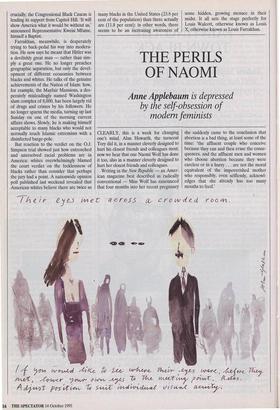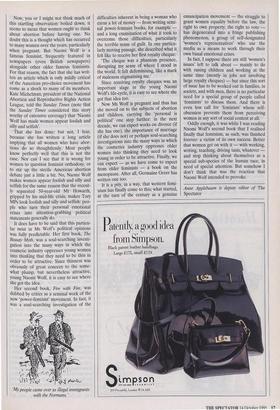THE PERILS OF NAOMI
Anne Applebaum is depressed
by the self-obsession of modern feminists
CLEARLY, this is a week for changing one's mind. Alan Howarth, the turncoat Tory did it, in a manner cleverly designed to hurt his closest friends and colleagues most; now we hear that one Naomi Wolf has done it too, also in a manner cleverly designed to hurt her closest friends and colleagues.
Writing in the New Republic — an Amer- ican magazine best described as radically conventional — Miss Wolf has announced that four months into her recent pregnancy she suddenly came to the conclusion that abortion is a bad thing, at least some of the time: 'the affluent couple who conceive because they can and then erase the conse- quences, and the affluent men and women who choose abortion because they were careless or in a hurry . . . are not the moral equivalent of the impoverished mother who responsibly, even selflessly, acknowl- edges that she already has too many mouths to feed.' Now, you or I might not think much of this startling observation: boiled down, it seems to mean that women ought to think about abortion before having one. No doubt this is a thought which has occurred to many women over the years, particularly when pregnant. But Naomi Wolf is a famous feminist, frequently featured in newspapers (even British newspapers) alongside other older famous feminists. For that reason, the fact that she has writ- ten an article which is only mildly critical of the American pro-choice movement has come as a shock to many of its members. Kate Michelman, president of the National Abortion and Reproductive Rights Action League, told the Sunday Times (note that the Sunday Times considered this story worthy of extensive coverage) that 'Naomi Wolf has made women appear foolish and silly and selfish'.
That she has done; but not, I fear, because she has written a long article implying that all women who have abor- tions do so thoughtlessly. Most people know perfectly well that this is not the case. Nor can I see that it is wrong for women to question feminist orthodoxy, or to stir up the sterile American abortion debate just a little a bit. No, Naomi Wolf makes women appear foolish and silly and selfish for the same reason that the recent- ly separated 50-year-old Mr Howarth, gripped by his mid-life crisis, makes Tory MPs look foolish and silly and selfish: peo- ple who turn their personal emotional crises into attention-grabbing political statements generally do.
It does have to be said that this particu- lar twist in Ms Wolf's political opinions was fully predictable. Her first book, The Beauty Myth, was a soul-searching investi- gation into the many ways in which the cosmetic industry oppresses young women into thinking that they need to be thin in order to be attractive. Since thinness was obviously of great concern to the some- what plump, but nevertheless attractive, young Naomi Wolf, it is easy to see where she got the idea.
Her second book, Fire with Fire, was dubbed by critics as a seminal work of the new 'power-feminist' movement. In fact, it was a soul-searching investigation of the My people came over as illegal immigrants with the Normans.' difficulties inherent in being a woman who earns a lot of money — from writing semi- nal power-feminist books, for example and a long examination of what it took to overcome those difficulties, particularly the terrible sense of guilt. In one particu- larly moving passage, she described what it felt like to receive her first royalty cheque: `The cheque was a phantom presence, disrupting my sense of where I stood in the world. It felt defeminising, like a mark of maleness stigmatising me.'
Since receiving royalty cheques was an important stage in the young Naomi Wolf's life-cycle, it is easy to see where she got that idea too. Now Ms Wolf is pregnant and thus has she moved on to the subjects of abortion and children, carrying the 'personal is political' one step further: in the next decade, we can expect works on divorce (if she has one), the importance of marriage (if she does not) or perhaps soul-searching investigations into the many ways in which the cosmetics industry oppresses older women into thinking they need to look young in order to be attractive. Finally, we can expect — as we have come to expect from older feminists — a book on the menopause. After all, Germaine Greer has written one too.
It is a pity, in a way, that western femi- nism has finally come to this; what started, at the turn of the century as a genuine emancipation movement — the struggle to grant women equality before the law, the right to own property, the right to vote has degenerated into a fringe publishing phenomenon, a group of self-designated `women's representatives' who use the media as a means to work through their own banal emotional crises.
In fact, I suppose there are still 'women's issues' left to talk about — mainly to do with raising children and working at the same time (mostly in jobs not involving large royalty cheques) — but since this sort of issue has to be worked out in families, in society, and with men, there is no particular need for a special group of people called `feminists' to discuss them. And there is even less call for 'feminists' whose self- obsession prevents them from perceiving women in any sort of social context at all.
Oddly enough, it was while I was reading Naomi Wolf's second book that I realised finally that feminism, as such, was finished forever: a victim of its own success. Better that women get on with it — with working, writing, teaching, driving taxis, whatever and stop thinking about themselves as a special sub-species of the human race, in need of special attention. But somehow I don't think that was the reaction that Naomi Wolf intended to provoke.
Anne Applebaum is deputy editor of The Spectator











































































 Previous page
Previous page